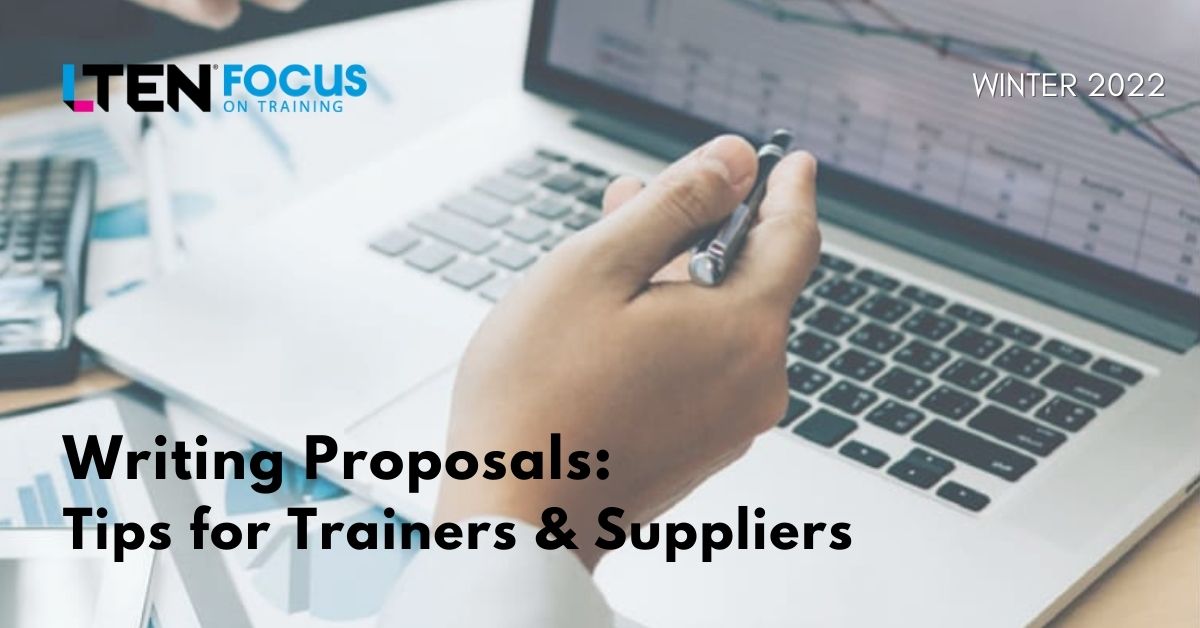
Writing Proposals: Tips for Trainers & Suppliers
Guest Editor – Monica Gillison
Here are some helpful tips to improve communications.
 The relationship between trainers and suppliers is a crucial one. I would even venture to say that trainers see suppliers as an important extension of the team.
The relationship between trainers and suppliers is a crucial one. I would even venture to say that trainers see suppliers as an important extension of the team.
As trainers, we are often befuddled when a supplier presents a proposal, and it just wasn’t what we were expecting. On the other hand, I’m quite sure many suppliers have wondered just what in the world are those trainers asking us to do?
Sometimes it probably appears as clear as mud.
Tips for Trainers
When writing a project request or request for proposal (RFP), take the extra time to map out all the pertinent details. Including things like company information, an RFP overview and timeline may seem commonplace. However, don’t forget to include such details as the administrative instructions, confidentiality statement, financial stability assessment, general RFP comments, customer references and RFP disclaimers. Also, information about your organization size, team breakdowns, selling process or philosophy, medical/legal review process, RFP response requirements, key RFP required information & questions to be answered, scoping details & deliverable requirements, training partner high-level responsibilities and proposal costs.
This may seem like quite a bit of detail, and you may feel as though your work is done. However, there’s one more essential component to creating a thorough RFP: It is important to include a section on frequently asked or anticipated questions and answers. You can shave time off of the process by doing this step up front.
Suppliers will appreciate the extra time it takes you to compile such a comprehensive document, and you will appreciate not having to sort through a bunch of repetitive questions that many suppliers will have. I will admit it’s no small feat, but it pays off in the end by ensuring that you will save time and end up with a well-matched partner who is able to fulfill your needs.
But don’t take it from me, listen to what some of the suppliers said. After we started incorporating this step in our process, we heard things like:
- “I have been working in this space for 26 years and this is the first time anyone has ever included some anticipated questions and suggested responses in the RFP. I mean wow and thank you!”
- “This really helps the agency partners.”
- “We have seen quite a few RFPs, and this was one of the best ones we have ever participated in.”
- “You have done a great job in anticipating our questions in advance.”
Tips for Suppliers
You’ve responded to the RFP and have been invited in to make a formal presentation. Congratulations! You’re excited and we’re excited, but we just don’t feel the same after the presentation. Now, you may be wondering what went wrong.
One of the things that is often commented on after the supplier leaves is that we just weren’t wowed by your presentation. We understand that you have great capabilities and that you can do whatever the client wants, but we often don’t know exactly what that is until we see it.
The No. 1 mistake is presenting a generalized proposal that isn’t specific to the project. We want to see something that is personalized and compelling. Take the risk and make it specialized and unique to us – when we see it, we will know it.
Coming Together
For both sides of the team, it’s important to remember to respect deadlines, prioritize support and challenge one another to keep the realities of the others’ business in mind. After all, we both have a common goal and if we follow these tips, we are sure to form a successful alliance.
When we work together, we grow together!
Monica Gillison is senior manager, commercial learning & development, for SK Life Science. Email Monica at mgillison@sklsi.com.








